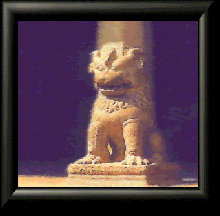
(p11) The Chapter
3 New Nippurland 1
Tyamato was passing melancholy days.
In BC 2226 years, the messenger visited from the Bahrland situated
in the Bahrain island.
He has offered "Since the king wishes Tyamato and the engagement,
I want to receive her."
A king's name was called Adapa.
Bahrland had separated no less than 600km from the southernmost
end (near present Basra) in the Mesopotamia.
It escaped invasion of Akkad and was prosperous as a trade city.
The rulers of Bahr land were Sumerians.
The trade range of Bahland reached Egypt,Somalia, Ethiopia, Mesopotamia,
the Arabian Peninsula, and Iran, India.
The Tyamato was not interested to the talk.
However, the Sumeramiko family who want assistance of an influential
man persuaded Tyamato forcibly, and summarized this marriage proposal.
The aim of Adapa was attaching trust nature to blood by marrying
the daughter of Sumeramiko.
He wanted to acquire a predominance-status in the countries in the
Persian Gulf which were the competition opponents on trade.
The Persian Gulf area was not established in the bottom of the influence
of Akkad.
In the area, the prestige of the Sumeramiko which is the leader
of a confederation of Sumer held still sufficient validity.
In BC 2321 years, the Adapa celebrated the eldest son of the aspiration
born between Tyamatoes.
He did the deification of Tonochi who is father of Tyamato.
He was exalted as incarnation of heavenly God.
Adapa named the son Tammurs.
In BC 2318 years, the Nanna which is a concubine produced the second
son's Adad.
Adapa was glad and he planned making a colonization city to India.
There was suitable land for the Indus middle.
He purchased land by money from surrounding Dravidans' feudal lord,
and emigrated the candidate.
He made the name of a town "Adad."
The small state by Dravidans was flooding around the Indus in India
of those days.
They performed farming and were mainly growing indica rice.
This rice was improved from Japonica rice so that Askans might suit
the climate natural features of India.
Once Askans' colonization city was assimilated to Dravidans during
long years.
The town of Ikguai developed exceptionally.
It united a surrounding small city and a surrounding village, formed
the state and was prosperous.
The name of Ikguai was replaced with "Hara."
The Hara city (Ikguai city) was the greatest city in the India Asia
University land of those days.
The population counted 400,000 persons.
Ameland had repeated a decline by the climate change.
This country came to receive invasion of the Kur tribe who is a
north mountains race from BC3300 age.
The great portion of Royal Families were escaped to Haraland or
Kaliland.
The Kaliland turned into Dravidans' land.
Kali God changed the name into Shiva.
It made the adherent expand also between Dravidans.
The Ganges district of those days was environment humid at high
temperature.
There was dotted with many swamps.
The amount of Japonica rice of harvest per unit area was preeminently
good compared with wheat or indica rice.
But, it had the fault of not growing if a labor is not applied continuously.
When the point indica rice sowed the seed into the swamp, the rest
was grown freely.
It had more amounts of harvest than wheat.
Since there was also no obstacle by the plant with the same crop
over and over, it was welcomed by Dravidans.
They drank alcohol, and danced and liked having a sex.
They showed interest to neither learning nor technical improvement.
In BC 2315 years, Ravana of the third son was produced between Tyamatoes.
The pride of the Tyamato was high.
The Nanna was a beauty with a good nature.
Adapa was moving the heart to Nanna.
Adapa considered Tammurs about succession of the throne at the beginning.
However, he came to change his mind gradually.
Isn't the second son's Adad more proper?
Tyamato knew change of mind of the husband who is not so much pleased
with birth of Ravana, and got angry.
She took the eldest son's Tammurs and Ravana and went over India.
The name of Sumeramiko did not bring the effect on trade to the
extent that it expected.
Merchants sharp to profits did not consider that the ostensible
dignity was great value.
Adapa repented of the marriage.
It was convenient that Tyamato crossed to India for him.
However, ministers were critical of having gone to India to the
Crown Prince.
At such time, a man called Bahhal exacted to navy admiral with the
relative of Nanna conspired with Qatar king Shamash on the opposite
shore, and changed the standard of revolt.
Adapa did not have a preparation in an unexpected attack.
He becomes a prisoner of war and was taken to Qatar.
Shamash made Nanna the wife and made a son called Singh bear in
BC2313.
In Bahr land, Bahhal who grasped real power became regency.
He set the young Adad on the new king, and carried out despotic
government resolutely.
Old vassals expressed the unpleasant sense to this.
They called back Tammurs from India secretly and opposed Bahhal.
The fighting bisected the army and delayed.
Tradition and the actual result worked advantageously and the old
vassal side was declared the winner.
Bahhal and Adad fled to Qatar.







